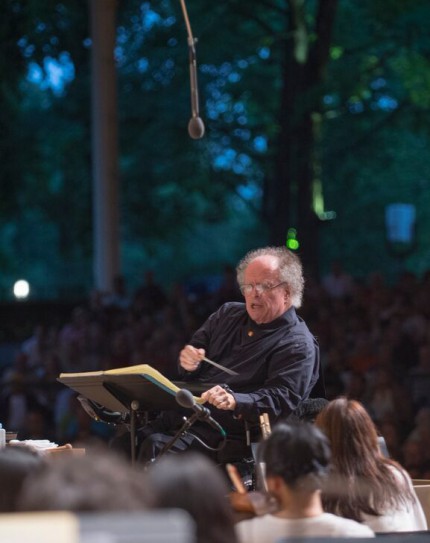Levine creates a Mahlerian storm in triumphant return to Ravinia

James Levine conducted the CSO in Mahler’s Symphony No. 2 Saturday night at Ravinia, his first appearance at the festival in 22 years. Photo: Patrick Gipson
As if the return of James Levine to Ravinia after 22 years didn’t have enough drama, the weather provided plenty Saturday night.
The evening’s heavy thunderstorms and torrential rains created dangerous conditions and flooded roads, which made it difficult getting to Highland Park. Even running from the parking lot to the shelter of Ravinia’s concert pavilion made one soaked through. (Thanks to the gentleman who shared his umbrella with me on that wet quick-march.)
It was too bad that of all the summer concert nights at Ravinia, such an important event had to be plagued by such lousy weather. Even so, the pavilion was largely full for Levine’s historic return to conduct the Chicago Symphony Orchestra in Mahler’s Symphony No. 2, and a few hardy souls stuck it out on the lawn even with rain and thunder continuing throughout the performance. (Saturday’s concert was a presentation of Ravinia’s Women’s Board marking their 50th year as well as the 80th anniversary of the CSO at Ravinia.)
It was the same Mahler “Resurrection” Symphony that was the vehicle for the young James Levine’s debut at Ravinia in 1971, conducting the CSO as a last-minute substitute. Such was the success of that appearance that Ravinia’s then-chief Edward Gordon immediately hired him as music director, a tenure that lasted until 1993.
Those of us who came of musical age in the 1980s have fond memories of the Levine era and its indefatigable leader. It was a time when the CSO was the proud centerpiece of the North Shore summer festival and there was a game sense of adventure and a pursuit of artistic excellence in classical music. That golden period seems a long way in the distance at a festival that seems largely focused these days on the corporate and commercial.
Levine has been plagued by ill health in recent years, most notably spinal injuries and Parkinson’s disease, which forced him to relinquish his position as music director of the Metropolitan Opera earlier this year after four decades in which he raised the company to new heights.
Even the most hardened cynic could not help but be touched by Levine’s entrance on the Ravinia stage Saturday night. Following a film tribute with veteran CSO members and Ravinia board members recalling his festival heyday, Levine entered on the scooter he now uses to get around. Rolling up the elevated podium built for this occasion, the 73-year-old conductor was clearly moved by the prolonged standing ovation that greeted him.
Then it was down to business. Perhaps it was the emotional occasion, but Saturday night’s performance of Mahler’s epic journey from darkness to triumphant life after death felt like even more of a secular church service than usual.
For much of the early going Levine’s Parkinson’s seemed under control and not apparent even on the large video screens. A fitful shakiness become more visibly pronounced in his gestures as the performance continued. Subsequently, there were moments when the lack of clarity from the raised podium had some impact, with smudged entrances and fleeting ensemble slips.
But if not having the polished precision of Levine’s prime CSO Mahler performances, the feeling, intelligence and complete commitment were manifest throughout. One could say his Mahler interpretation has grown even deeper and richer in expression with the intervening decades. And despite his infirmities, Levine directed the music with great energy and intensity, almost knocking over his music stand at times in the heat of the moment.
The opening movement had ample drama yet also an affecting world-weary quality in the rising string theme. The music went with consistent strong drive and vehemence; David Herbert’s metallic hammered timpani attacks were jarring in intensity, with the rumble of distant thunder providing running percussion obbligato.
The Andante was more rustic than usual yet also had lightness and charm in the magical hushed final string pizzicatos. The CSO clarinets accentuated the satiric vein of the ensuing scherzo with boisterous brass in the middle section. Mezzo-soprano Karen Cargill’s plush chest voice and expressive phrasing was an effective signpost in the symphony’s turn toward the light in the brief “Urlicht” movement.
The expansive final section was the clear culmination in Saturday’s performance. Levine’s patient direction consistently took the long view, building through the evocative offstage brass calls—wonderfully atmospheric–to the march of the dead and the steady ascent to the triumphant final bars. Unlike many Mahler performances there was no sense of the work as a vehicle for sonic spectacle but a deep and profound journey from life’s darkness and trials to a shining afterlife.
Soprano Ying Fang’s bright soprano blended well with Cargill’s dark mezzo. Under Duain Wolfe’s direction, the CSO Chorus was at their finest, barely audible in the initial hushed “Auferstehen” and growing in strength and confidence to the resplendent final bars in a majestic coda that managed to avoid bombast.
When the conductor finally wheeled around in his chair to acknowledge the loud cheers and applause, the ovation became tumultuous.
Levine will return in November to lead the CSO downtown. But let’s hope that he will be back at his former Ravinia home again next summer as well–as a regular conductor at the very least.